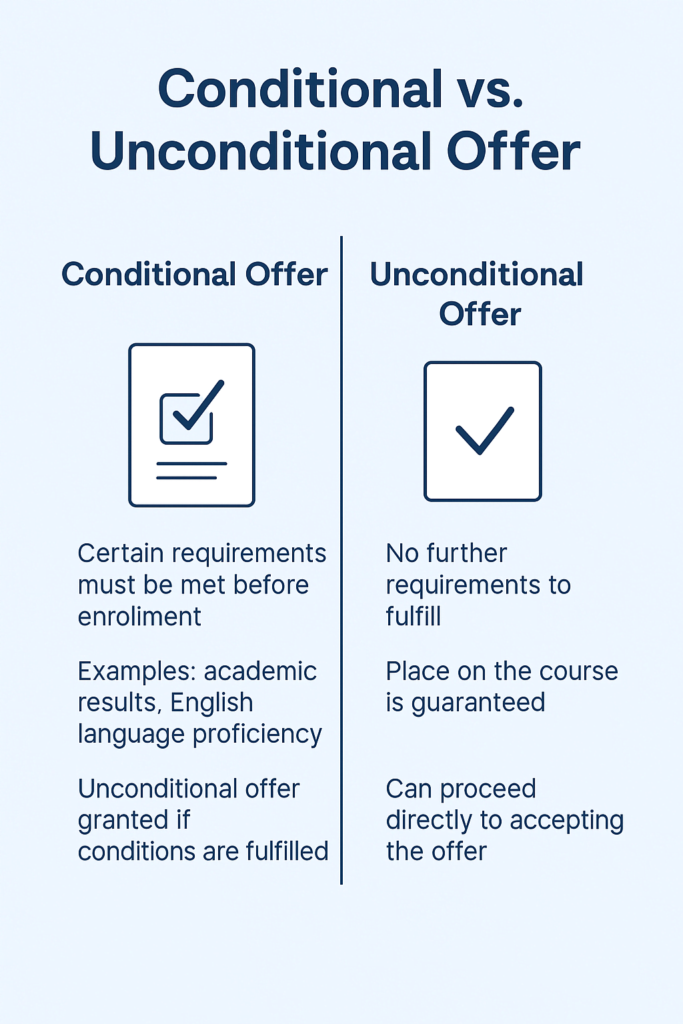Understanding Conditional vs. Unconditional Offers

Receiving your admission offer is a huge step toward your dream of studying in a new country.
But now you’re staring at terms like conditional offer and unconditional offer, and wondering what they actually mean, and what you’re supposed to do next.
If this sounds like you, you’re not alone. Many students are unsure of the difference between these two types of admission offers—and getting it wrong can cost you time, money, and even your spot at the university.
Read on for a detailed guide on the vital things you need to know about conditional vs. unconditional offers, how to respond to each, and what they mean for your student visa application.
What Is a Conditional Offer?
A conditional offer means that the university wants to admit you, but only if you meet certain requirements before you can enroll.
Think of it as a “yes, but…” offer.
Common Conditions in a Conditional Offer Letter
-
Achieving specific grades or scores in your final exams (e.g., WAEC, NECO, A-levels, IB)
-
Meeting a minimum English language requirement (e.g., IELTS, TOEFL, PTE score)
-
Providing final transcripts or certificates
-
Submitting missing documents (passport copy, recommendation letter, etc.)
-
Paying a deposit fee to secure your place
If your conditional offer requires showing proof of financial capability, here’s a guide on how to show proof of funds for your Canada study visa.
Example: You apply to a university in the UK while you’re still awaiting your final WAEC results. The school may issue a conditional offer saying, “We’ll admit you if you score at least a B3 in English and Mathematics.”
What You Should Do
-
Carefully review the conditions stated in the offer letter.
-
Start working on fulfilling them as early as possible (book your IELTS, send transcripts, etc.).
-
Once you’ve met all conditions, submit evidence to the university.
-
The university will then issue an unconditional offer, which is what you need to apply for a study visa.
Some schools require sponsorship documents to issue an unconditional offer. Read what you need to know about Canada study visa financial sponsors here
What Is an Unconditional Offer?
An unconditional offer means you’ve already met all the university’s academic and admission requirements. No strings attached—you’re in!
It’s the green light that tells you that you’re fully accepted.
This type of offer is usually given to students who have already completed their previous studies, submitted all required documents, and met all English language and academic requirements
Example: You applied to a Canadian college after submitting your diploma, transcripts, IELTS results, and passport. The school reviews everything and sends you an unconditional offer saying, “We’re happy to offer you a place on our program starting Fall 2025.”
What You Should Do
-
Accept the offer and proceed to the visa application stage.
-
Pay your tuition deposit or full fees (as required).
-
Begin preparing for your study visa application.
Conditional vs. Unconditional Offer- key differences
| Feature | Conditional Offer | Unconditional Offer |
|---|---|---|
| Admission Status | Not final – based on fulfilling conditions | Final – no further requirements |
| Visa Application | Can’t apply yet (except with LOA in Canada) | Can apply immediately |
| Next Step | Submit pending documents or meet conditions | Pay the deposit and begin visa process |
| Common for | Applicants awaiting results or documents | Applicants with complete applications |
What Should You Do After Receiving Each Offer?
If You Receive a Conditional Offer
-
Read the conditions carefully and check deadlines.
-
Reach out to the admissions team if anything is unclear.
-
Work quickly to fulfill the requirements.
-
Once completed, send proof to the school and request an unconditional offer letter.
If You Receive an Unconditional Offer
-
Celebrate
-
Accept the offer by the given deadline (this might involve signing and sending back a form).
-
Pay your tuition deposit to secure your seat.
-
Begin your student visa application process with this offer letter.
Which Type of Offer Do You Need for a Student Visa?
This depends on the country you’re applying to.
-
Canada: Many colleges allow you to apply for a study permit with a Letter of Acceptance (LOA), which may still be conditional. However, visa success is higher when you provide a final (unconditional) letter. If you’re still deciding on the best program, this guide can help you choose the right courses to study in Canada
-
UK: You typically need an unconditional offer to get a CAS (Confirmation of Acceptance for Studies), which is essential for your visa.
-
Australia & New Zealand: Similar to the UK, they often require unconditional offers for visa processing.
-
USA: Conditional offers are rare. Most US schools issue full admission after reviewing all documents.
Frequently Asked Questions
1. Can I apply for a visa with a conditional offer?
It depends on the country. In most cases, visa officers want to see that you’ve met all academic and admission conditions.
2. Can a conditional offer turn into a rejection?
Yes—if you fail to meet the required conditions, the university has the right to withdraw the offer. If you’re still exploring programs that align with long-term goals, check out the top 15 courses to study abroad in 2025. Choosing the right course can help ensure your offer becomes unconditional.
3. Should I accept a conditional offer?
Yes, if you’re confident that you can meet the conditions. It reserves your spot at the university.
4. Can I accept more than one offer?
You can receive multiple offers, but you must choose one when applying for your visa and paying fees.
Understanding the difference between conditional and unconditional offers is crucial for planning your study abroad journey. A conditional offer is a stepping stone—it means you’re almost there. An unconditional offer is your final ticket to applying for your study visa and starting your international education adventure.
Take your time, ask questions, meet the deadlines, and stay organized. Each offer brings you closer to your dream.
Achieve your dream of studying abroad on the Hitouch Global Platform



